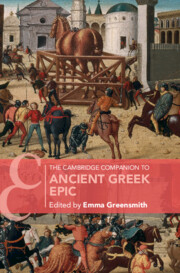Book contents
- The Cambridge Companion to Ancient Greek Epic
- The Cambridge Companion to Ancient Greek Epic
- Copyright page
- Contents
- Figures
- Contributors
- Preface
- Introduction
- Part I Epic Engagements
- Part II Epic Space
- 4 Space and Story
- 5 Do Not Talk Death to Me
- 6 Epic Dislocation
- 7 Shrunken Epic
- Part III Epic Time
- Part IV Epic People
- Part V Epic Feelings
- Part VI Epic Without End
- Epilogue
- Timeline of Ancient Greek Epic
- Bibliography
- Index Locorum
- Subject Index
- Cambridge Companions To Literature
6 - Epic Dislocation
Nostalgia and Return
from Part II - Epic Space
Published online by Cambridge University Press: 04 December 2024
- The Cambridge Companion to Ancient Greek Epic
- The Cambridge Companion to Ancient Greek Epic
- Copyright page
- Contents
- Figures
- Contributors
- Preface
- Introduction
- Part I Epic Engagements
- Part II Epic Space
- 4 Space and Story
- 5 Do Not Talk Death to Me
- 6 Epic Dislocation
- 7 Shrunken Epic
- Part III Epic Time
- Part IV Epic People
- Part V Epic Feelings
- Part VI Epic Without End
- Epilogue
- Timeline of Ancient Greek Epic
- Bibliography
- Index Locorum
- Subject Index
- Cambridge Companions To Literature
Summary
This chapter explores the spatial dimensions of the trope of the epic return journey (the nostos) and focuses on the physical and emotive experiences which such a journey produces. Loney first highlights dislocation as an important feature in epic, and a motivating force behind its plot: the feeling of being separated in time or space from a more ideal past or home. Under this single conception of ‘dislocation’, the chapter brings together two poetic themes which scholars have traditionally treated discretely: nostalgia and homesickness. Archaic epics, especially Hesiod’s Works and Days, rely on a narrative of decline—of temporal dislocation—from an antecedent ‘golden age’, for which internal characters and external audiences are nostalgic. Similarly, characters in Homer’s Iliad and Odyssey may be spatially dislocated and homesick, motivating a return journey (prototypically Odysseus, but also at moments Achilles and Helen).
- Type
- Chapter
- Information
- The Cambridge Companion to Ancient Greek Epic , pp. 130 - 146Publisher: Cambridge University PressPrint publication year: 2024

